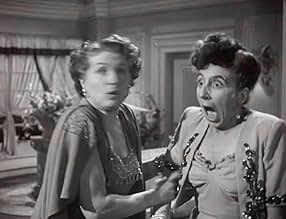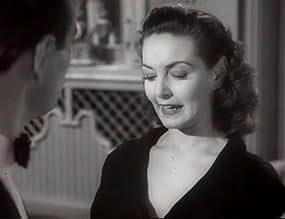Upper class young man has to resort to employment, together with his valet/butler in tow. He finds a job escourting a robot out for an evening, and they end up in a hotel and a farce ensues ... Read allUpper class young man has to resort to employment, together with his valet/butler in tow. He finds a job escourting a robot out for an evening, and they end up in a hotel and a farce ensues when roles are swapped.Upper class young man has to resort to employment, together with his valet/butler in tow. He finds a job escourting a robot out for an evening, and they end up in a hotel and a farce ensues when roles are swapped.
Anita Sharp-Bolster
- Lady Diana
- (as Anita Bolster)
Patti Morgan
- Telephonist
- (uncredited)
Geoffrey Sumner
- Well Dressed Man On Underground
- (uncredited)
Featured reviews
As a British attempt to do some American 'screwball' comedy, it falls very short of the mark. Perhaps the same vehicle in the hands of someone like Cary Grant could have made it work but not the set of actors in this. As a traditional British farce it works better but not by much, and sadly points up the fact that light comedy was not really Nigel Patrick's forte.
In a short role as a effeminate dress sales clerk, Jerry Desmonde goes as far as you could without shouting out 'gay man,' in the days of fifties cinema. Pity his later roles were mainly playing stooge to the likes of Norman Wisdom.
This type of broad slapstick farce and comedy of errors was slowly dying out to be replaced by the more subtle Ealing comedies. And wouldn't really return till the more risqué Carry Ons of the swinging sixties.
All a bit dated in all and only vaguely amusing in the sense of 'they don't make them like that any more' type of way.
In a short role as a effeminate dress sales clerk, Jerry Desmonde goes as far as you could without shouting out 'gay man,' in the days of fifties cinema. Pity his later roles were mainly playing stooge to the likes of Norman Wisdom.
This type of broad slapstick farce and comedy of errors was slowly dying out to be replaced by the more subtle Ealing comedies. And wouldn't really return till the more risqué Carry Ons of the swinging sixties.
All a bit dated in all and only vaguely amusing in the sense of 'they don't make them like that any more' type of way.
The Perfect Woman (1949) -
It really was amazing how quickly two people could fall in love back in 1949 - That was the only note I took down whilst watching this film and sadly, because it was a bit forgettable, I can't really think what else to write about it in this review.
I know that it wasn't offensive and that there was a charm to it and an element of fun, but I don't think that I could really say much about the general construction of the film.
The only characters I can recall were the professor who invented the "Perfect Woman" and who was cute in his own way, but quite typical of inventors in film and also Stanley Holloway's butler, a man who knew his place, but didn't stay there.
I'm sure that they all gave perfectly adequate performances, because otherwise I would have made a note of it and I know that Irene Handl usually delivers a great character, but perhaps there have just been too many of this type of film that meant it didn't leave a specific mark.
The actual robot needing instructions to move or do anything, was a bit silly, like the daft scene in 'Mrs Doubtfire' (1993), where Robin Williams had to keep changing personas over dinner and that was a tired humour even in 1949 as far as I'm concerned.
So while it wasn't a bad film, it really didn't make any kind of impression on me and I wouldn't bother with it again.
380.61/1000.
It really was amazing how quickly two people could fall in love back in 1949 - That was the only note I took down whilst watching this film and sadly, because it was a bit forgettable, I can't really think what else to write about it in this review.
I know that it wasn't offensive and that there was a charm to it and an element of fun, but I don't think that I could really say much about the general construction of the film.
The only characters I can recall were the professor who invented the "Perfect Woman" and who was cute in his own way, but quite typical of inventors in film and also Stanley Holloway's butler, a man who knew his place, but didn't stay there.
I'm sure that they all gave perfectly adequate performances, because otherwise I would have made a note of it and I know that Irene Handl usually delivers a great character, but perhaps there have just been too many of this type of film that meant it didn't leave a specific mark.
The actual robot needing instructions to move or do anything, was a bit silly, like the daft scene in 'Mrs Doubtfire' (1993), where Robin Williams had to keep changing personas over dinner and that was a tired humour even in 1949 as far as I'm concerned.
So while it wasn't a bad film, it really didn't make any kind of impression on me and I wouldn't bother with it again.
380.61/1000.
Nigel Patrick is to begin a job in a few weeks. Until then, his aunt, Philippa Gill, won't let him have any money. He and his valet, Stanley Holloway answer an ad from Miles Malleson. Malleson has just built a robot he has modeled on his niece, Patricia Roc. For plot purposes, he wants Patrick to field-test the automaton in a hotel. Meanwhile, he is reminded that he has a lecture give that evening. Miss Roc -- the real one; the fake one is played by the appropriately named Pamela Devis -- has been housebound too long and decides to pose as the robot for a night on the town.
This is a set-up for a farce that the movies have been using at least since Lubitsch's DIE PUPPE.. Like many a post-war British sex farce, it seems a bit sniggering and brittle, but the cast is perfect. Not only was Malleson born to play woolly-brained old men, but there's Irene Handl as a maid-of-all-work called "Buttercup" and David Hurst as a Swiss prototype for Manuel in FAWLTEY TOWERS.
This is a set-up for a farce that the movies have been using at least since Lubitsch's DIE PUPPE.. Like many a post-war British sex farce, it seems a bit sniggering and brittle, but the cast is perfect. Not only was Malleson born to play woolly-brained old men, but there's Irene Handl as a maid-of-all-work called "Buttercup" and David Hurst as a Swiss prototype for Manuel in FAWLTEY TOWERS.
What a pity. This film could have been a little gem. But it had an inferior director with no vision, Bernard Knowles, and was totally ruined by almost maniacally unrestrained over-acting by Nigel Patrick and Stanley Holloway, who are about as subtle as a pair of howling hyenas. The story had great promise. It concerns an absent-minded genius who has invented a robot which looks like a woman, and in fact is made to resemble his pretty young niece, charmingly played by Patricia Roc. The niece ends up impersonating the girl robot, to what should have been hilarious effect. However, none of it comes off. The genius is brilliantly played by Miles Malleson, with some terrific comic moments, and there is another superb supporting performance by the always-reliable Irene Handl. But they cannot save the film, alas. If only Nigel Patrick and Stanley Holloway had been replaced by robots, it might have worked.
A promising cast and premise are wasted in this woefully weak effort. The absence of a sharp script and tight direction is made worse by desperate over-acting. The participants were rewarded for the time they spent on the film. Unlike the viewers.
Did you know
- TriviaPamela Devis's debut.
- Quotes
Mrs. Butters: You and your Mars and your Jupiter. Why don't you come down to Earth for a change?
Details
- Runtime
- 1h 29m(89 min)
- Color
- Aspect ratio
- 1.37 : 1
Contribute to this page
Suggest an edit or add missing content


































